Papers & Publications
The Procurators of the Propaganda Fide Papal Congregation in Canton and Macao
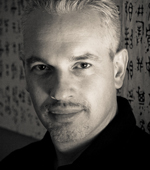 Dr. Eugenio Menegon, CGCM faculty associate, recently published an article entitled "Interlopers at the Fringes of Empire: The Procurators of the Propaganda Fide Papal Congregation in Canton and Macao, 1700-1823" in Cross-Currents: East Asian History and Culture Review. The article can be found here.
Dr. Eugenio Menegon, CGCM faculty associate, recently published an article entitled "Interlopers at the Fringes of Empire: The Procurators of the Propaganda Fide Papal Congregation in Canton and Macao, 1700-1823" in Cross-Currents: East Asian History and Culture Review. The article can be found here.
Abstract: The office of the procurator of the papal Sacred Congregation for the Propagation of the Faith (Sacra Congregatio de Propaganda Fide) offers a unique case study of noncommercial interloping in the long eighteenth century in the Pearl River Delta, and reveals the complexity and fluidity of life at the intersection of Asian and European maritime environments in that special human ecosystem. The oceanic infrastructure of the Age of Sail and the Sino-Western trade system in Canton sustained the Catholic missionary enterprise in Asia, and the professional figure of the procurator represented its economic and political linchpin. Procurators were agents connected with both European and Qing imperial formations, yet not directly at their service. They utilized existing maritime trade networks to their own advantage without being integral parts of those networks’ economic mechanisms. All the while, they subverted Qing prohibitions against Christianity. Using sources preserved in Rome, this article offers new insights into the global mechanisms of trade, communication, and religious exchange embodied by the procurators-interlopers and their networks, with significant implications for the history of the Sino-Western trade system, Qing policies toward the West and Christianity, and the history of Asian Catholic missions.
Church Planting in Post-Christian Soil
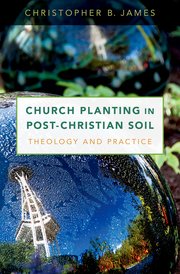 Christopher James, BUSTH alumnus, was awarded the Gold Medal in Theology for his book Church Planting in Post-Christian Soil by the Illumination Book Awards. Book Description: "Christopher James attends carefully to stories of ecclesial innovation taking place in Seattle, Washington-a city on the leading edge of trends shaping the nation as a whole. James's study of the new churches founded in this "post-Christian" city offers both theological reflection and pragmatic advice."
Christopher James, BUSTH alumnus, was awarded the Gold Medal in Theology for his book Church Planting in Post-Christian Soil by the Illumination Book Awards. Book Description: "Christopher James attends carefully to stories of ecclesial innovation taking place in Seattle, Washington-a city on the leading edge of trends shaping the nation as a whole. James's study of the new churches founded in this "post-Christian" city offers both theological reflection and pragmatic advice."
Call for Papers: Medical Missions and Health
Call for Papers Journal of Social History of Medicine and Health Special Issue on Medical Missions and Health
The term “Medical Missions” is most strongly associated with nineteenth and twentieth century Christian missionaries from Europe and the United States traveling to countries in Asia, Africa, or Latin America and practicing medicine, providing education leading to careers in medicine (physicians, nurses, midwives, pharmacists, etc.) and, especially as the twentieth century progressed, conducting work in public health. Both at the time and later, supporters of missions cited medical missions as tangible evidence of the value of missionary work, and even those critical of missionary endeavors more broadly frequently praised medical missionaries. Scholars have also explored how medical missionaries have contributed to “modernization.” From the 1980s onward, however, scholars have explored connections between medical missions and imperialism. This is connected to broader scholarship on the links between the spread of medical techniques and education associated with “scientific medicine” and imperialist ideologies, and can be found in scholarship on “missionaries of science” such as people associated with the Rockefeller Foundation as well as missionaries dedicated to the propagation of specific religious ideologies. At the same time, scholarship on how local actors interpreted and adapted missionary medical programs challenged a simple model of medical imperialism. Scholarship on medical missions has extended into the twenty-first century, studying medical missions amid growing globalization and new medical challenges.
This special issue seeks essays that contend with these issues pertaining to the study of medical missions, broadly conceived, from any time period and in any location. The definition of “medical missions” is deliberately flexible. If scholar can make a case that their topic fits into the category of “medical missions” the article will be considered. To ensure consideration papers must be submitted by March 28, 2018 to shemoca@plattsburgh.edu . Earlier inquiries are welcome. Essays should be between 7500 and 9500 words.
The language of the journal is Chinese, but English language submissions are welcome and will be translated into Chinese.
Sexual Politics and Christianity in Africa
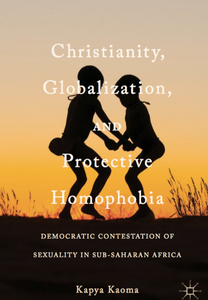 In his most recent book, Christianity, Globalization, and Protective Homophobia, Visiting Researcher Kapya Kaoma illuminates the complex and contested nature of sexual politics in sub-Saharan Africa. He examines the way competing understandings of sexuality collide and intermingle, and seeks a way beyond the impasse.
In his most recent book, Christianity, Globalization, and Protective Homophobia, Visiting Researcher Kapya Kaoma illuminates the complex and contested nature of sexual politics in sub-Saharan Africa. He examines the way competing understandings of sexuality collide and intermingle, and seeks a way beyond the impasse.
Latin America and Early Modern Christianity
 The Latin American context played a central, although often neglected, role in the many Christian traditions emerging from the Early Modern era. This year, Rady Roldán-Figueroa, BuSTH professor and CGCM faculty affiliate, has explored this intersection between Latin America and European Christianity in the following works: C. Douglas Weaver and Rady Roldán-Figueroa, Exploring Christian Heritage: A Reader in History and Theology, 2nd rev. ed. (Baylor University Press, 2017), Rady Roldán-Figueroa, “Introduction: Race as a Category of Anthropological Difference in the Formative Stage of Peripheral Catholicism,” in Early Modern Theologies of Race in the Age of European Expansion, ed. Rady Roldán-Figueroa, special issue of the Journal of Early Modern Christianity 4/2 (2017), “Martin Luther in Latin America: From the Counter-Reformation Myth of Latin American Catholicism to Luther as Religious Caudillo,” in Martin Luther. A Christian between Reforms and Modernity (1517-2017), ed. Alberto Melloni, Federica Meloni, and Stefania de Nardis (Berlin: De Gruyter, 2017). [In English, with German translation], “Martin Lutero in America Latina: Dal mito controriformistico del cattolicesimo latinoamericano a Lutero come caudillo religioso,” in Lutero: Un cristiano tra riforme e modernità (1517-2017), ed. Alberto Melloni, Federica Meloni, and Stefania de Nardis (Torino: Unione tipografico-editrice torinese, 2017), “Religious Literature and its Institutional Contexts: Prelude to the Study of Spanish Accounts of Christian Martyrdom in Tokugawa Japan,” Archiv für Reformationsgeschichte/Archive for Reformation History (Special Issue: “The Global Impact of the Reformations: Long-Term Influences and Contemporary Ramifications” / “Die Weltwirkungen der Reformation: Zeitgenössische und langfristige Folgen der religiösen Reformbewegungen des 16. Jahrhunderts”), 108 (2017).
The Latin American context played a central, although often neglected, role in the many Christian traditions emerging from the Early Modern era. This year, Rady Roldán-Figueroa, BuSTH professor and CGCM faculty affiliate, has explored this intersection between Latin America and European Christianity in the following works: C. Douglas Weaver and Rady Roldán-Figueroa, Exploring Christian Heritage: A Reader in History and Theology, 2nd rev. ed. (Baylor University Press, 2017), Rady Roldán-Figueroa, “Introduction: Race as a Category of Anthropological Difference in the Formative Stage of Peripheral Catholicism,” in Early Modern Theologies of Race in the Age of European Expansion, ed. Rady Roldán-Figueroa, special issue of the Journal of Early Modern Christianity 4/2 (2017), “Martin Luther in Latin America: From the Counter-Reformation Myth of Latin American Catholicism to Luther as Religious Caudillo,” in Martin Luther. A Christian between Reforms and Modernity (1517-2017), ed. Alberto Melloni, Federica Meloni, and Stefania de Nardis (Berlin: De Gruyter, 2017). [In English, with German translation], “Martin Lutero in America Latina: Dal mito controriformistico del cattolicesimo latinoamericano a Lutero come caudillo religioso,” in Lutero: Un cristiano tra riforme e modernità (1517-2017), ed. Alberto Melloni, Federica Meloni, and Stefania de Nardis (Torino: Unione tipografico-editrice torinese, 2017), “Religious Literature and its Institutional Contexts: Prelude to the Study of Spanish Accounts of Christian Martyrdom in Tokugawa Japan,” Archiv für Reformationsgeschichte/Archive for Reformation History (Special Issue: “The Global Impact of the Reformations: Long-Term Influences and Contemporary Ramifications” / “Die Weltwirkungen der Reformation: Zeitgenössische und langfristige Folgen der religiösen Reformbewegungen des 16. Jahrhunderts”), 108 (2017).
17th Century African Christian Queen Njinga
 European powers expanding into southwest Africa in the 17th century confronted a cunning and capable leader in Queen Njinga. Linda Heywood has been uncovering the story of this complex figure, teasing out how she ruled and what role her faith played in her kingdom. Most recently, she gave lectures on the subject in London and Bristol, England, as she draws closer to the publication of Njinga, History, Memory, and Politics and Culture: Angola and the African Diaspora. This fall, Haywood will lecture on Queen Njinga at the Library of Congress on November 9th (see flyer here) and again on December 14th at the Mariners' Museum. (the photo to the left is of Dr. Heywood at her recent lecture at the Library of Congress).
European powers expanding into southwest Africa in the 17th century confronted a cunning and capable leader in Queen Njinga. Linda Heywood has been uncovering the story of this complex figure, teasing out how she ruled and what role her faith played in her kingdom. Most recently, she gave lectures on the subject in London and Bristol, England, as she draws closer to the publication of Njinga, History, Memory, and Politics and Culture: Angola and the African Diaspora. This fall, Haywood will lecture on Queen Njinga at the Library of Congress on November 9th (see flyer here) and again on December 14th at the Mariners' Museum. (the photo to the left is of Dr. Heywood at her recent lecture at the Library of Congress).
Religion and Democratization
 Over the last century, some Western scholars have argued that certain religious traditions--first Catholicism, and increasingly in the contemporary world, Islam--are inherently incompatible with democratic forms of government. In a recent essay published in The Immanent Frame, CGCM faculty associate Jeremy Menchik, remembered the work of political scientist Alfred Stepan. Stepan's scholarship resisted moves to paint any religious tradition as necessarily undemocratic, highlighting through his diligent research ways in which religious communities creatively participate in democratic governance. Much of Stepan's later scholarship centered on the religiously plural context of India and the predominantly Islamic context of Indonesia.
Over the last century, some Western scholars have argued that certain religious traditions--first Catholicism, and increasingly in the contemporary world, Islam--are inherently incompatible with democratic forms of government. In a recent essay published in The Immanent Frame, CGCM faculty associate Jeremy Menchik, remembered the work of political scientist Alfred Stepan. Stepan's scholarship resisted moves to paint any religious tradition as necessarily undemocratic, highlighting through his diligent research ways in which religious communities creatively participate in democratic governance. Much of Stepan's later scholarship centered on the religiously plural context of India and the predominantly Islamic context of Indonesia.
African Pentecostalism
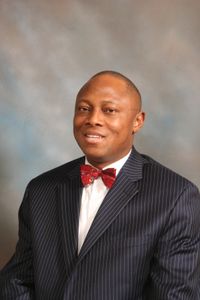 The study of African Pentecostalism has blossomed in the last decade. In his recent essay for the Oxford Research Encyclopedia of African History, "Pentecostalism in Africa," CGCM faculty associate Nimi Wariboko surveys the current state of historical scholarship on Pentecostalism in different African contexts. He highlights the priorities of such scholarship and points toward important trajectories for future work in the field.
The study of African Pentecostalism has blossomed in the last decade. In his recent essay for the Oxford Research Encyclopedia of African History, "Pentecostalism in Africa," CGCM faculty associate Nimi Wariboko surveys the current state of historical scholarship on Pentecostalism in different African contexts. He highlights the priorities of such scholarship and points toward important trajectories for future work in the field.
Christian-Muslim Relations and State Formation in West Africa
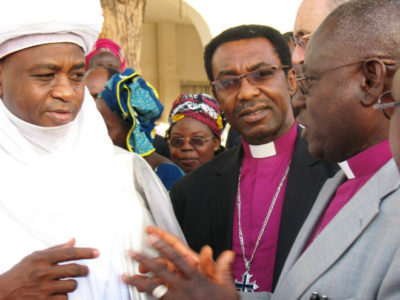 Many emerging countries in postcolonial West Africa have found themselves at the center of Christian-Muslim interactions in the contemporary world. Nimi Wariboko's new piece, "Christian-Muslim Relations and the Ethos of State Formation in West Africa” in Evelyn A. Reisacher (ed.), Dynamics of the Muslim Worlds: Regional, Theological, and Theological Perspectives (Downers Groove, IL: IVP Academic 2017), explores the ways in which such state formation is both shaped by and shapes (sometimes coopting for the state's own ends) dynamics between these two religious communities.
Many emerging countries in postcolonial West Africa have found themselves at the center of Christian-Muslim interactions in the contemporary world. Nimi Wariboko's new piece, "Christian-Muslim Relations and the Ethos of State Formation in West Africa” in Evelyn A. Reisacher (ed.), Dynamics of the Muslim Worlds: Regional, Theological, and Theological Perspectives (Downers Groove, IL: IVP Academic 2017), explores the ways in which such state formation is both shaped by and shapes (sometimes coopting for the state's own ends) dynamics between these two religious communities.
Biography in Latin American Pentecostalism
 In his recent book, Tales of Mutual Influence: Biography as Missiology in Latin American Pentecostalism, Angel D. Santiago-Vendrell (BuSTH alumnus and professor of evangelism at Asbury Theological Seminary) explores the role of biography in the Pentecostal missionary endeavor in Latin America. Following the movement across the 20th century, Santiago-Vendrell describes its journey beginning with early American missionaries, its transmission in Latin America, and then its return to the United States through Latino/a migrant communities.
In his recent book, Tales of Mutual Influence: Biography as Missiology in Latin American Pentecostalism, Angel D. Santiago-Vendrell (BuSTH alumnus and professor of evangelism at Asbury Theological Seminary) explores the role of biography in the Pentecostal missionary endeavor in Latin America. Following the movement across the 20th century, Santiago-Vendrell describes its journey beginning with early American missionaries, its transmission in Latin America, and then its return to the United States through Latino/a migrant communities.